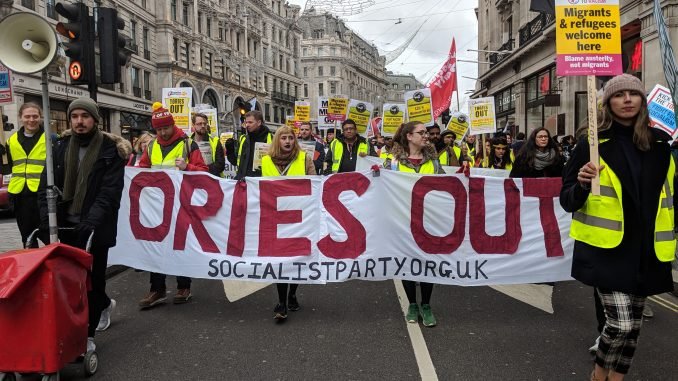

(Picture- socialist party)
The National Education Union, civil service union PCS, lecturers and university staff in UCU, and junior doctors in BMA have called for strike action on Budget Day, 15 March.
This joint action represents a step forward from the series of strike actions taken by workers from various sectors that have taken place recently. The living standards of many have plummeted due to the high cost of rent and heating, which have stretched household budgets. Wages are growing at only half the rate of inflation, and this is due to the increasing precariousness in employment, including through zero-hour contracts and the gig economy, as well as the housing crisis. More than 1.7 million people are unemployed, and research by Generation Rent has found that private sector arrears have more than tripled from 4% to 13% during the pandemic.
Cuts in public services, a widening wealth gap, and declining living standards for most working and middle-class people could lead to further anger in Britain.
Councils have all the tools to solve the crisis. They could use the resources available to improve millions of workers’ lives. Instead, the councils have spent the last decade dutifully carrying out the Tories’ cuts. As a result, generalized anger is developing among the people and local community about the shrinking living standards of working-class people.
The Tory plans are increasing the profits of energy companies. Shell alone has made a staggering £31 billion over the last 12 months, while electricity distributors like Northern Powergrid have taken a total of £15.8 billion in profits in the previous year. Under the Tories’ new energy bill plans, working-class people carry the burden.
The government is telling workers that there is no alternative to cuts and pay freezes and that ordinary people should bear the brunt of the financial and economic crisis. At the same time, the government is ensuring that super profits are safeguarded and the rich are getting richer.
With capitalism in crisis, workers can expect an unrelenting assault on their living standards. Only a determined fightback by working-class people involving coordinated strike action can reverse this offensive.
Last year and this year, ongoing strike action is taking place locally and nationally. Mass strike action was held on 1 February, showing what national unions can mobilize when they take the lead.
National Education Union (NEU) members had picket lines, as the rail unions and the postal workers did, which included active picket lines to demand a pay rise. Most of the local areas had more than 200 picket lines. For a union that has never taken a stand like this before, it shows the mood of members and that “if you fight, you can win!”
Amazon workers took strike action, the first time the online retailer has seen official strike action in the UK. Workers in depots, including Bristol, Tilbury, Dartford, Belvedere, and Rugeley, took part in sit-down protests in Amazon canteens against an offer that would amount to just £10 a week for the average worker. Now, workers in Coventry represented by the GMB are going forward with strike action, supported by 98% of those who voted in the ballot, to demand £15 an hour.
The Communication Workers Union (CWU) supports the postal workers’ strike. They are striking to protect pay and terms and conditions in Parcelforce and Royal Mail and to protect and maintain services for the general public. Royal Mail’s business model now is for casualisation to turn it into a courier service by attacking the terms and conditions of the current workforce. The CWU supports the demand to renationalise the postal service back into public ownership.
On March 15th, the strike will be strengthened with 600,000 civil servants on strike. The Trades Union Congress (TUC) could further build it, coordinating the action and organising a demonstration on that day with as many unions as possible from across the public and private sectors joining. Additionally, the University and College Union will join the national strike action, health and rail unions have live ballots, and Royal Mail workers in the CWU will soon announce their re-ballot results. This could bring three-quarters of a million workers on the streets, fighting together for better pay and conditions.
Many Sri Lankan diaspora workers are also joining in with these strike actions, including those who work in the Royal Mail, health sector, and education sector, as they are also facing difficult conditions. Tamils Solidarity fully supports these actions, and TS members attend most of the strike rallies and mass actions that are taking place now.
It is also important that workers involved in these actions come forward to discuss the action plan collectively. The harsh conditions are not going to change anytime soon, so we need a decisive action plan to defend our conditions and win our rights and wages.
TS appeals to all diaspora workers who are involved in the action to contact us at info@tamilsolidarity.org.
Many workers have not joined a union, particularly in the private sector, who should also join the fightback. If you would like to get more information about joining a union or the strike actions taking place, please get in touch with TS.
